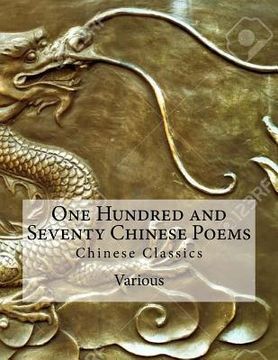Reseña del libro "One Hundred and Seventy Chinese Poems: Chinese Classics (en Inglés)"
Those who wish to assure themselves that they will lose nothing by ignoring Chinese literature, often ask the question: "Have the Chinese a Homer, an Aeschylus, a Shakespeare or Tolstoy?" The answer must be that China has literature of some importance. The novel exists and has merits, but never became the instrument of great writers. Her philosophic literature knows no mean between the traditionalism of Confucius and the nihilism of Chuang-tzu. In mind, as in body, the Chinese were for the most part mainlanders. Their thoughts set out on no strange quests and adventures, just as their ships discovered no new continents, yet their literature has a delicacy and refinement that is not found in the Western canon. Yet we must recognize that for thousands of years the Chinese maintained a level of rationality and tolerance that the West might well envy. They had no Index, no Inquisition, and no Holy Wars. Superstition has indeed played its part among them; but it has never, as in Europe, been perpetually dominant. It follows from the limitations of Chinese thought that the literature of the country should excel in reflection rather than in speculation. That this is particularly true of its poetry will be gauged from the present volume. In the poems of Po Chü-i no close reasoning or philosophic subtlety will be discovered; but a power of candid reflection and self-analysis which has not been rivalled in the West. Turning from thought to emotion, the most conspicuous feature of European poetry is its pre-occupation with love. This is apparent not only in actual "love-poems," but in all poetry where the personality of the writer is in any way obtruded. The poet tends to exhibit himself in a romantic light; in fact, to recommend himself as a lover. The Chinese poet has a tendency different but analogous. He recommends himself not as a lover, but as a friend. He poses as a person of infinite leisure (which is what we should most like our friends to possess) and free from worldly ambitions (which constitute the greatest bars to friendship). He would have us think of him as a boon companion, a great drinker of wine, who will not disgrace a social gathering by quitting it sober. To the European poet the relation between man and woman is a thing of supreme importance and mystery. To the Chinese, it is something commonplace, obvious-a need of the body, not a satisfaction of the emotions. These he reserves entirely for friendship. Accordingly we find that while our poets tend to lay stress on physical courage and other qualities which normal women admire, Po Chu-i is not ashamed to write such a poem as "Alarm at entering the Gorges." Our poets imagine themselves very much as Art has portrayed them-bare-headed and wild-eyed, with shirts unbuttoned at the neck as though they feared that a seizure of emotion might at any minute suffocate them. The Chinese poet introduces himself as a timid recluse, "Reading the Book of Changes at the Northern Window," playing chess with a Taoist priest, or practicing caligraphy with an occasional visitor. If "With a Portrait of the Author" had been the rule in the Chinese book-market, it is in such occupations as these that he would be shown; a neat and tranquil figure compared with our lurid frontispieces. The 'macho man' myth never took hold with the Chinese.

